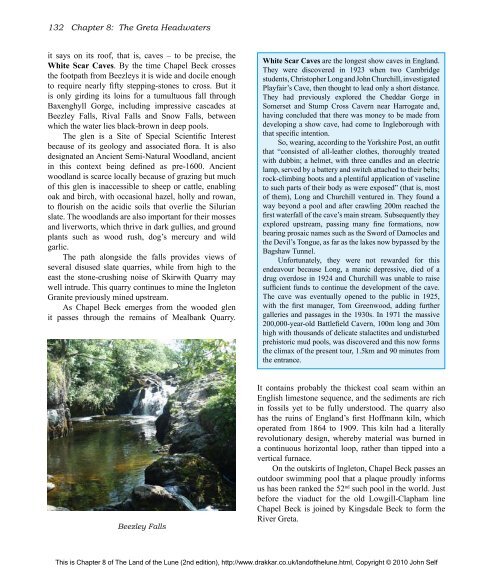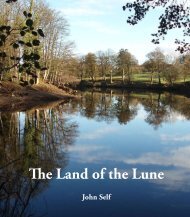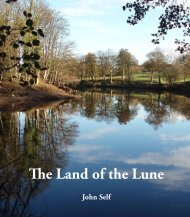CHAPTER 8: The Greta Headwaters
CHAPTER 8: The Greta Headwaters
CHAPTER 8: The Greta Headwaters
Create successful ePaper yourself
Turn your PDF publications into a flip-book with our unique Google optimized e-Paper software.
132 Chapter 8: <strong>The</strong> <strong>Greta</strong> <strong>Headwaters</strong><br />
it says on its roof, that is, caves – to be precise, the<br />
White Scar Caves. By the time Chapel Beck crosses<br />
the footpath from Beezleys it is wide and docile enough<br />
to require nearly fifty stepping-stones to cross. But it<br />
is only girding its loins for a tumultuous fall through<br />
Baxenghyll Gorge, including impressive cascades at<br />
Beezley Falls, Rival Falls and Snow Falls, between<br />
which the water lies black-brown in deep pools.<br />
<strong>The</strong> glen is a Site of Special Scientific Interest<br />
because of its geology and associated flora. It is also<br />
designated an Ancient Semi-Natural Woodland, ancient<br />
in this context being defined as pre-1600. Ancient<br />
woodland is scarce locally because of grazing but much<br />
of this glen is inaccessible to sheep or cattle, enabling<br />
oak and birch, with occasional hazel, holly and rowan,<br />
to flourish on the acidic soils that overlie the Silurian<br />
slate. <strong>The</strong> woodlands are also important for their mosses<br />
and liverworts, which thrive in dark gullies, and ground<br />
plants such as wood rush, dog’s mercury and wild<br />
garlic.<br />
<strong>The</strong> path alongside the falls provides views of<br />
several disused slate quarries, while from high to the<br />
east the stone-crushing noise of Skirwith Quarry may<br />
well intrude. This quarry continues to mine the Ingleton<br />
Granite previously mined upstream.<br />
As Chapel Beck emerges from the wooded glen<br />
it passes through the remains of Mealbank Quarry.<br />
Beezley Falls<br />
White Scar Caves are the longest show caves in England.<br />
<strong>The</strong>y were discovered in 1923 when two Cambridge<br />
students, Christopher Long and John Churchill, investigated<br />
Playfair’s Cave, then thought to lead only a short distance.<br />
<strong>The</strong>y had previously explored the Cheddar Gorge in<br />
Somerset and Stump Cross Cavern near Harrogate and,<br />
having concluded that there was money to be made from<br />
developing a show cave, had come to Ingleborough with<br />
that specific intention.<br />
So, wearing, according to the Yorkshire Post, an outfit<br />
that “consisted of all-leather clothes, thoroughly treated<br />
with dubbin; a helmet, with three candles and an electric<br />
lamp, served by a battery and switch attached to their belts;<br />
rock-climbing boots and a plentiful application of vaseline<br />
to such parts of their body as were exposed” (that is, most<br />
of them), Long and Churchill ventured in. <strong>The</strong>y found a<br />
way beyond a pool and after crawling 200m reached the<br />
first waterfall of the cave’s main stream. Subsequently they<br />
explored upstream, passing many fine formations, now<br />
bearing prosaic names such as the Sword of Damocles and<br />
the Devil’s Tongue, as far as the lakes now bypassed by the<br />
Bagshaw Tunnel.<br />
Unfortunately, they were not rewarded for this<br />
endeavour because Long, a manic depressive, died of a<br />
drug overdose in 1924 and Churchill was unable to raise<br />
sufficient funds to continue the development of the cave.<br />
<strong>The</strong> cave was eventually opened to the public in 1925,<br />
with the first manager, Tom Greenwood, adding further<br />
galleries and passages in the 1930s. In 1971 the massive<br />
200,000-year-old Battlefield Cavern, 100m long and 30m<br />
high with thousands of delicate stalactites and undisturbed<br />
prehistoric mud pools, was discovered and this now forms<br />
the climax of the present tour, 1.5km and 90 minutes from<br />
the entrance.<br />
It contains probably the thickest coal seam within an<br />
English limestone sequence, and the sediments are rich<br />
in fossils yet to be fully understood. <strong>The</strong> quarry also<br />
has the ruins of England’s first Hoffmann kiln, which<br />
operated from 1864 to 1909. This kiln had a literally<br />
revolutionary design, whereby material was burned in<br />
a continuous horizontal loop, rather than tipped into a<br />
vertical furnace.<br />
On the outskirts of Ingleton, Chapel Beck passes an<br />
outdoor swimming pool that a plaque proudly informs<br />
us has been ranked the 52 nd such pool in the world. Just<br />
before the viaduct for the old Lowgill-Clapham line<br />
Chapel Beck is joined by Kingsdale Beck to form the<br />
River <strong>Greta</strong>.<br />
This is Chapter 8 of <strong>The</strong> Land of the Lune (2nd edition), http://www.drakkar.co.uk/landofthelune.html, Copyright © 2010 John Self




